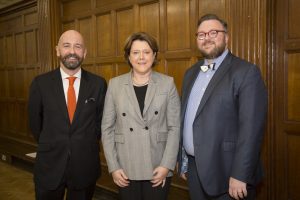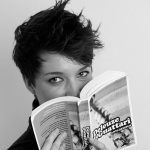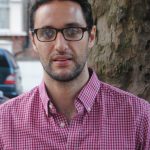Marc Mason, co-author of world’s first research into Sexuality at the Bar
Posted on: 3 October 2017
By: raymonm
No Comments »
Filed under: Meet the academics

Spotlight on…Marc Mason, co-author of world’s first research into Sexuality at the Bar
On 25 September 2017 Marc Mason announced the prelim results of the first research which sought to understand the career experiences of LGBT+ barristers.
Where?
The prelim results were launched at an event entitled “Sexuality at the Bar: An Empirical Exploration into the Experiences of LGBT+ Barristers in England & Wales”, co-organised by Westminster Law School, the UCL Centre for Ethics and Law, and 29 Bedford Row Chambers.
Who?
The research was undertaken by Marc Mason, Senior Lecturer at the Westminster Law School, in collaboration with Dr Steven Vaughan, Senior Lecturer at the Faculty of Law at University College London who presented their findings and engaged in discussions with a group of of invited panellists including Barristers and Law experts.
What?
The research project, the first of its kind, used a survey of 126 practicing barristers, pupils and students, and 38 interviews, asking them about the extent to which their sexuality has impacted on their legal practice and their experience in the workplace and exploring the role and function of LGBT+ support networks for barristers.
Using an open call survey collecting qualitative and quantitative data, the results show a variety of complex practices which govern whether (and when and how) LGBT+ members of the Bar feel comfortable being open about their sexuality as well as highlighting a significant number of LGBT+ barristers who have experienced work-related bullying and/or discrimination. The research also suggests an increasing role for Bar-specific LGBT+ networks and the value of LGBT+ role models, both at the Bar and in the judiciary.
Why?
The research project, the first of its kind, sought to understand the career experiences of LGBT+ barristers, asking them about
the extent to which (if at all) their sexuality has impacted on their legal practice, and to explore the role and function of LGBT+ support networks for barristers.
Speaking about his work, Researcher and Senior Lecturer Marc Mason said:
“We were delighted with the level of response to our research, as it has enabled us to generate some really fascinating and useful data around the way the issues of sexuality, and to some degree gender identity, are dealt with at the Bar. Whilst the Bar is a relatively small profession in terms of numbers, it is widely considered an influential elite and therefore diversity issues such as access and representation become even more important. We hope that the research findings will be useful to the profession and to those concerned with equality and diversity more broadly.”
Marc Mason (Left) with Dr Steven Vaughan (right)

Meet the Academic: Francis King

Posted on: 10 September 2015
By: raymonm
No Comments »
Filed under: Meet the academics
Please describe yourself and your role in a few sentences?
I have joined the Law School as Senior Lecturer in Property Law and hope to share my passion for all things property with the law students on a number of modules.
What is your area of academic interest?
My research is interdisciplinary, incorporating aspects of tort, land law, environmental law, and social policy, but it primarily focuses on the power dynamics evidenced in property-based disputes. My doctoral thesis, entitled ‘A Foucauldian Exploration of the Statutory Authority Defence to an Action in Private Nuisance’, uses the work of Michel Foucault as a framework for contextualising these dynamics in relation to the state-endorsed infringement on private property rights for infrastructure development.
Please tell us a bit about the teaching that you are involved in?
I have previously taught on built environment and construction undergraduate and postgraduate programmes, and I hope to share this practical property approach with students in the Law School.
What was your first job?
I was a fitness instructor on cruise ships and worked on a number of luxury liners, including the QE2!
Where did you work before coming to Westminster?
I was a lecturer in the School of Law at the University of Essex.
What has been the highlight of your career to date?
Securing funding to work on an education project close to my heart: Producing a pilot for an online problem-based learning project for student researchers and practitioners.
What advice would you give students during their studies and after graduation?
Both during and after – Don’t be afraid to get in touch with people and ask for advice, help, support, or opportunities to attend events.
What advice would you give students considering studying this subject?
Be tenacious – the road ahead will take perseverance, patience and determination!
What are your interests/leisure activities?
I have a passion for live music and, as my husband is in a band, I get to indulge it most weekends. I also have a love for the home-made and keep my creative side alive by baking, sewing, knitting and crocheting.
Meet the Academic: Professor Marilyn Freeman

Posted on: 17 March 2015
By: raymonm
No Comments »
Filed under: Meet the academics
Leading child law expert and international child abduction specialist, Professor Marilyn Freeman, has joined Westminster Law School as Principal Research Fellow.
Professor Freeman is co-director of the International Centre for Family Law, Policy and Practice (ICFLPP) which will be affiliated to the University of Westminster, and which she co-heads with family law and dispute resolution specialist Frances Burton. With the support of its patron, Baroness Hale of Richmond (Deputy-President of the Supreme Court of the United Kingdom), ICFLPP works to develop multi-disciplinary cross-jurisdictional approaches to the challenges of international family law and to engage in collaborative research on these issues.
Professor Freeman joins the University of Westminster from London Metropolitan University where she was Reader in Family and Child Law, before becoming Professor of Family Law in 2010. Professor Freeman said: “I am very excited about joining Westminster Law School as Principal Research Fellow and the opportunities this presents for working with colleagues to develop creatively our mutual research interests, and to mine the interface between our various disciplines, in a way which both supports and enhances the student experience at our institution.”
Elizabeth Duff, Head of Westminster Law School, said: “Marilyn Freeman brings an enormous amount of expertise and experience to Westminster Law School; her research and passion for teaching are threads that run through all her work and these resonate with the vision of the School as we aspire to make an impact on the wider community through the work of our Student Law Clinic and internationally recognised research and teaching.”
Professor Freeman was called to the English Bar (Middle Temple) in 1986 after completing an LLM at Kings College, London. Her research efforts and practical work have focussed on areas such as international child abduction, forced marriage and relocation – she gained her doctorate in international child abduction. She is widely acknowledged as a leading expert in these areas in which she remains actively involved. She held the position of Head of the reunite Research Unit for many years, and has undertaken several ground-breaking research projects, some supported by government departments such as the Foreign and Commonwealth Office and the Ministry of Justice, including research into both international child abduction and relocation, most recently publishing her research into the long-term effects of child abduction in December 2014.
ICFLPP is holding its triennial conference entitled Culture, Dispute Resolution and the Modernised Family on 6-8 July 2016 in London. Professor Freeman and Frances Burton organised two international family law conferences in 2010 and 2013, which attracted widespread global support and recognition. For further information, please visit www.famlawandpractice.com.
More about Westminster Law School.
Meet the academic: Victoria Brooks

Posted on: 6 January 2015
By: wyattr1
No Comments »
Filed under: Meet the academics, Uncategorized
Please describe yourself and your role in a few sentences?
I am a Lecturer in Law and Doctoral Researcher at the School of Law. I teach a combination of modules (through a variety of different methods) across the LLB and GDL, including Tort, Mooting, Philosophy of Law and Law of the Environment. My teaching and my research are radical and interdisciplinary, theoretical and applied.
What is your area of academic interest?
My PhD in progress is Deleuzian and attempts to examine laws in spaces of sexuality, particularly the coast. My philosophical interests concern the relation between law and immanence, as well as the legalities of the material body and its folds. I am also interested in the space and performance of law, particularly the courtroom, and how bodies and the materiality of the space produce and affect the act of judgment.
Please tell us a bit about the teaching that you are involved in?
I teach both traditional legal disciplines, together with more radical and theoretical approaches to law. I like to make my sessions as interactive and inclusive as possible, as well as playing with the spatial dynamics of the classroom, in addition to integrating visualisation and technology into the classroom as teaching aids. I currently teach Tort law at undergraduate level, as well as the Graduate Diploma in Law, in addition to Law of the Environment on the LLB.
What was your first job?
My first job was as a Legal Secretary in a law firm back in 2001.
Where did you work before coming to Westminster?
Following my first job as a Legal Secretary, I then worked my way up to being a Paralegal in various other law firms before deciding to come to the University of Westminster to study my LLB in 2009. In my final year, I was inspired by my dissertation supervisor (now my PhD supervisor) to undertake a PhD at Westminster.
What has been the highlight of your career to date?
The highlight of my career so far has been a completely electric seminar that I did for Law of the Environment last year, which I delivered on Deleuze and his conceptualisation of immanence and its relation to law. The students were amazing, completely engaged and helped in both ‘drawing’ the concept of immanence and its relation to law, as well as helping to build a virtual ‘word cloud’ of what immanence means to them. It is a highlight because ideas flew between all of us, meaning that all of us were inspired, and we were able to see the concept growing and building throughout the session. I was left buzzing for days afterwards and the pictures we drew are displayed in my office to remind me of this inspirational seminar!
What advice would you give students during their studies and after graduation?
To keep an open mind, to seek inspiration, to wander.
What advice would you give students considering studying this subject?
To take modules that will challenge your way of thinking and to think creatively.
What are your interests/leisure activities?
Reading, walking, long baths and peppermint tea.
Meet the academic: Ioannis Glinavos

Posted on: 6 January 2015
By: wyattr1
No Comments »
Filed under: Meet the academics, Uncategorized
Please describe yourself and your role in a few sentences?
I am Senior Lecturer in Law at Westminster Law School. I am module leader for Company Law and teach on a range of Business and Commercial Law modules. My research is on Law and Economics, focusing particularly on the financial crisis.
What is your area of academic interest?
Law and Economics, Financial Regulation, Investment Arbitration.
Please tell us a bit about the teaching that you are involved in?
Company Law, Commercial Law, Introduction to Business Law.
What was your first job?
Teaching Fellow in Law at SOAS.
Where did you work before coming to Westminster?
University of Reading.
What has been the highlight of your career to date?
The publication of my second monograph in September 2013.
What advice would you give students during their studies and after graduation?
Listen to advice and always do the best you can.
What advice would you give students considering studying this subject?
Think critically about the world around you.
What are your interests/leisure activities?
I spend all my time on Twitter.
Meet the academic: Simon Flacks

Posted on: 6 January 2015
By: wyattr1
No Comments »
Filed under: Meet the academics, Uncategorized
Please describe yourself and your role in a few sentences?
I co-convene Family Law and teach criminal justice. Before entering academia, I worked in the charity sector (undertaking human rights work and mental health advocacy) and in journalism.
What is your area of academic interest?
I have broad research interests that include youth justice, drug policy, human rights, discrimination and gender/sexuality. My PhD addressed under-18 drug treatment.
Please tell us a bit about the teaching that you are involved in?
At the moment, I teach family law, although I will also be teaching on criminal justice modules in the future. Both are really broad subjects, and I enjoy discussing controversial issues that students can get their teeth into!
What was your first job?
My first full time job was as a local newspaper reporter on the Brighton Argus, although I did lots of waiting tables and bar work before that.
Where did you work before coming to Westminster?
The University of Reading.
What has been the highlight of your career to date?
Getting a job in the university sector. I love the work and feel lucky to have found something I really enjoy doing.
What advice would you give students during their studies and after graduation?
Although there is a lot of emphasis on gaining the right skills and grades, try and enjoy the opportunity to learn about interesting subjects too. Choose modules that arouse your curiosity, rather than the ones you suppose might be easiest – I always found I did better in the subjects I liked anyway! In the same vein, try work experience in a variety of organisations so you can find out what you really enjoy doing. University should be about exploration.
What advice would you give students considering studying this subject?
The great thing about law is that there is so much variety. You can stick to legislation and cases if that’s what interests you, but there is also the opportunity to study the law ‘in context’. That might include learning about sociology, philosophy or politics.
What are your interests/leisure activities?
I love travel and the outdoors. I also take an interest in film and popular culture.
